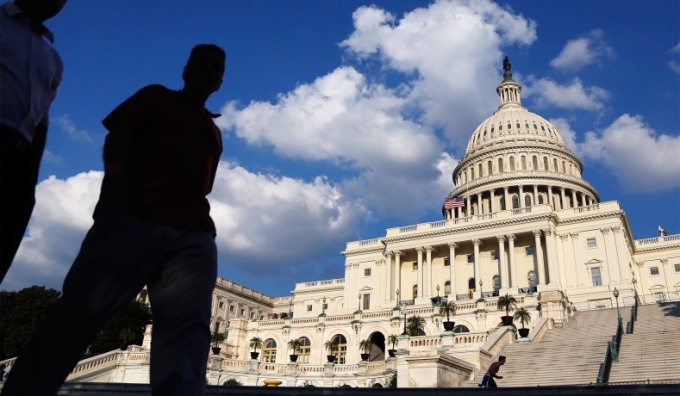Stocks are on fire, the economy is in a tailspin, the government is shut down and the world is in trouble if the US defaults.
Leaders from the US Congress and the White House are trying to reach a deal to raise the debt ceiling as the Treasury Department is just weeks away from running out of options to prevent an unprecedented US government default.
If they fail and the government defaults on its debts, economists and financial experts predict chaos. "It could spread and destroy the entire financial system, which would ultimately destroy the economy," said Mark Zandi, chief economist at Moody's.
Treasury Secretary Janet Yellen said the agency can only last until June 1, before the government runs out of money. The specific date - known as the "X-date" - depends on the actual budget situation and could vary by several weeks.
The implications of a default could be complex. The interplay of falling home values, rising interest rates, and a destabilized global financial system is difficult to calculate. Some estimates suggest that more than 8 million jobs could be lost. Mortgage rates could rise more than 20%, and the economy could shrink as much as it did during the 2008 recession. Here are the seven scenarios that experts worry about most.

Tourists walk past the US Capitol building in Washington. Photo: Reuters
Stocks plunge
So far, financial markets have been relatively calm about the debt ceiling impasse. The cost of protecting the U.S. government against default has risen, reflecting doubts about its ability to repay its debt. But the shocks have been minor for most households.
That will change as the government gets closer to default. Experts say the shock of default will ripple through the financial system — stocks, bonds, mutual funds, derivatives — before spreading to the rest of the economy.
Wall Street will likely be the first casualty. Stock prices will fall sharply in anticipation of a broader recession as interest rates rise and investors pull money out of the market to maintain access to short-term cash. The banking sector could tighten lending even further.
The last time the US was on the brink of default, the stock market was on fire. In 2011, with less than a week to go until X-date, major indexes fell 20%. This time, Moody’s Analytics estimates that stock prices could fall by about 20%, wiping out $10 trillion in household wealth and devastating the retirement accounts of millions of Americans. The White House says the decline could be closer to 45%. The $46 trillion bond market would also be shaken, as the value of existing Treasury bonds collapses in response to higher yields on new ones.
Sudden recession
If the impasse persists, the impact will quickly spread from financial markets to the broader economy. The decline in household wealth across the country—caused by the stock sell-off—will reduce spending power, hurting businesses.
And a spike in interest rates would make it harder to get a loan or start a small business. The already-cold housing market would collapse. Zillow predicts that defaults would push mortgage rates above 8% and home sales would fall 23%. Construction and other sectors would be hit.
The most dramatic impact could be the suspension of regular federal payments to tens of millions of American families, including seniors who receive health insurance — Medicare, Social Security — and those who rely on food stamps.
The federal government is expected to spend about $6 trillion this year, or about $16 billion a day, on those social security payments. Of course, not all of the money will go directly to households, but that’s a huge amount of money that would disappear from the economy overnight.
The Treasury Department said the 2011 debt ceiling impasse caused a $2.4 trillion decline in household wealth. The White House Council of Economic Advisers said the economy as a whole could shrink by as much as 6%, similar to the 2008 crisis.
US government shutdown
The US government has a process for shutting down when Congress fails to pass a new budget. Agencies with unapproved spending will furlough workers. Some “essential” employees will continue to work without pay. There have been three shutdowns lasting at least a day in the past decade.
But experts say a shutdown over default may be different, given the lack of precedent. The White House Office of Management and Budget has not yet released guidance on a shutdown involving default, which some analysts say would be difficult.
The federal government is the nation’s largest employer, with about 4.2 million full-time employees. The National Association of Government Employees, which represents nearly 75,000 federal employees, has filed a lawsuit challenging the constitutionality of the debt ceiling, saying it poses potential risks to employees.
Social Security Programs Delay
More than 60 million Americans receive monthly "Social Security" benefits, mostly seniors. A similar number rely on "Medicare" for health insurance.
Some Republicans have argued that the government could continue to pay for these benefits even without borrowing more, by redirecting future tax revenue. But budget experts question the Treasury’s ability to pay the benefits on time if the default drags on for weeks or months.
If the government continues to spend on social security with incoming tax revenue, it may have to choose between doing so and paying down debt. But missing interest payments could worsen the financial crisis.
US borrowing costs rise
The US government can borrow at low interest rates because no one thinks the world's largest economy will default on its debt. The safety of US government bonds has made them an essential foundation of the world's financial system.
Serving as reserves for everything from foreign central banks to money market funds, US Treasury bonds are widely recognized as one of the safest and most liquid investments, backed by confidence in the US government.
A default could end decades of cheap borrowing costs for the United States, economists say. One estimate from the Brookings Institution suggests a default could increase federal borrowing costs by $750 billion over the next decade.
Global economy affected
Many countries protect their finances by buying large amounts of US government bonds, believing them to be among the safest assets in the world. But a default could reduce the value of those bonds, damaging many countries' reserves.
Economists worry that this will add to the woes of countries already heavily indebted, such as Sri Lanka and Pakistan. The Federal Reserve’s interest rate hikes over the past year to combat inflation have eroded the value of the US Treasury bonds many countries hold. And according to the Council on Foreign Relations, more than half of the world’s foreign exchange reserves are held in US dollars—nearly three times more than any other currency.
USD and US reputation decline
Financial experts have been tracking some early signs that the world economy is starting to reduce its reliance on the dollar. Some countries like Brazil and Malaysia are calling for more frequent transactions in other currencies. Sixty percent of foreign exchange transactions still take place in dollars, but a US debt default — which could send the greenback’s value plunging — could change that.
“This risks undermining America’s global economic leadership and calls into question our ability to protect our national security interests,” Janet Yellen said of the default scenario last week.
Experts say a default could also damage America’s standing on the world stage, as it would be the result of domestic political turmoil. The White House’s credibility is partly tied to its ability to respond to crises. A default would cast doubt on the U.S. government’s ability to respond to emergencies and to perform one of its most basic functions — paying its bills.
If the US fails to do so, citizens and other national leaders may wonder what else the White House cannot manage. A default would erode global confidence in the US political system, because part of the country’s standing rests on international belief that the US political system is fundamentally sound. “And a default would show that it is not,” said Daniel Bergstresser, an associate professor of finance at Brandeis University’s School of International Business.
Phien An ( according to Washington Post )
Source link


































































![[Photo] National Assembly Chairman Tran Thanh Man receives Chairman of Morocco-Vietnam Friendship Association](https://vphoto.vietnam.vn/thumb/402x226/vietnam/resource/IMAGE/2025/7/26/b5fb486562044db9a5e95efb6dc6a263)



































Comment (0)